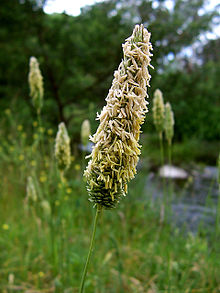Tall Grass
| Grasses Temporal range: Early Cretaceous - recent, Barremian–0 |
|
|---|---|
 |
|
| Flowering head of meadow foxtail (Alopecurus pratensis), with stamens exerted at anthesis | |
| Scientific classification | |
| Kingdom: | Plantae |
| Clade: | Angiosperms |
| Clade: | Monocots |
| Clade: | Commelinids |
| Order: | Poales |
| Clade: | Graminid clade |
| Family: |
Poaceae Barnhart |
| Type genus | |
|
Poa L. |
|
| Subfamilies | |
| Synonyms | |
|
Gramineae Juss. |
|
Gramineae Juss.
Poaceae (/poʊˈeɪsiaɪ/) or Gramineae is a large and nearly ubiquitous family of monocotyledonous flowering plants known as grasses. Poaceae includes the cereal grasses, bamboos and the grasses of natural grassland and cultivated lawns and pasture. Grasses have stems that are hollow except at the nodes and narrow alternate leaves borne in two ranks. The lower part of each leaf encloses the stem, forming a leaf-sheath. With around 780 genera and around 12,000 species, Poaceae are the fifth-largest plant family, following the Asteraceae, Orchidaceae, Fabaceae and Rubiaceae.
Grasslands such as savannah and prairie where grasses are dominant are estimated to constitute 40.5% of the land area of the Earth, excluding Greenland and Antarctica. Grasses are also an important part of the vegetation in many other habitats, including wetlands, forests and tundra. The Poaceae are the most economically important plant family, providing staple foods from domesticated cereal crops such as maize, wheat, rice, barley, and millet as well as forage, building materials (bamboo, thatch, straw) and fuel (ethanol).
...
Wikipedia
